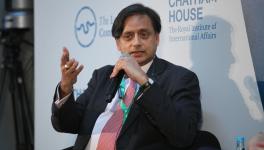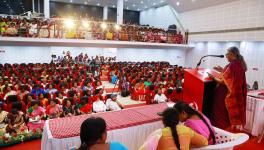Zaira Wasim and Limits of Liberalism
Image Courtesy : The Telegraph
Zaira Wasim`s case that has created a storm in social media is an ideal case that highlights the limits of liberalism, and why liberal philosophy and principles are neither a sufficient check for growing economic inequalities nor for rise of cultural majoritarianism. One can always defend Zaira Wasim`s quitting the Bollywood as her `personal choice`, and that her `individual` persuasion has to be respected. Outside the structure of how community works and how one should locate dominant and regulatory hegemony, the question of choice can cut both ways. This in fact has been the history of liberalism, and critique offered by those critical of the limits of liberalism.
Critical thinker of Frankfurt School, Herbert Marcuse in his celebrated essay on `Repressive Tolerance` precisely explores this difficult terrain of privileging choice in societies marred by grave structural inequalities. These inequalities are, in turn, informed by real social power to make the choices one is defending. When communities, individuals and groups lack the social power to make real-time choice or exercise freedom or liberty, then liberal principles of choice, autonomy and tolerance `always-already` tilt the balance to maintaining power inequalities, in the name of freedom and tolerance. Power operates not in justifying force but mostly in legitimising it through available principles of freedom and justice. The validity of invoking choice and autonomy has to be made sense of in the context of power equations that underlie them, not as sacrosanct principles in themselves. The irony of liberalism is that those least invested in principles of choice are those who invoke it most vociferously. Cultural majoritarianism does not discard liberalism but grows by arguing that not enough of liberalism is being invoked; not the most `authentic` kind of liberalism is deployed. Therefore, cultural nationalists complain against pseudo-secularism. Not secularism itself. They argue how tolerance is working against the interests of the majority community, they hardly complain about the principle of tolerance itself. This botched up appropriation of the principle of tolerance was on display when people who complained of intolerance were threatened for not recognising how tolerant Indians were.
Herbert Marcuse, invoking the ideas of `destructive tolerance` and `benevolent neutrality`, argues, “Such indiscriminate tolerance is justified in harmless debates, in conversation, in academic discussion; it is indispensable in the scientific enterprise, in private religion. But society cannot be indiscriminate where the pacification of existence, where freedom and happiness themselves are at stake: here, certain things cannot be said, certain ideas cannot be expressed, certain policies cannot be proposed, certain behaviour cannot be permitted without making tolerance an instrument for the continuation of servitude.” Liberal principles are fungible, precisely because they operate within the context of unequal power relations.
One can raise and frame the `choice` Zaira Wasim has made in quitting Bollywood in persuasion of higher spiritual ends in a number of ways. The question is whether those modes take into consideration the underlying power relations. The fact that Kashmir (every society, not Kashmir alone) and religion, (every religion, not Islam alone) remains structured within deeply unequal gender relations. How are those celebrating Zaira Wasim`s choice as `pure` freedom taking into account the underlying structural infringements? Have unequal power equations disappeared? How has power suddenly disappeared to give rise to a context of `pure` choice? In what kinds of nefarious ways can power operate, even if it is not stated in the letter she wrote? It is this underlying reality that is obfuscated by those refusing to discuss this as an issue of power, religion, and about social content of Kashmiri society, as it stands today. Is there a possibility for power to operate in ways that may not have been captured by her letter and by the liberal principles of choice, tolerance and autonomy? This should be the driving force, especially for her compatriots from Kashmir and Muslim society.
Also read: The Indian Liberal’s Conundrum
It should not be very difficult to make sense of this in a context of growing cultural nationalism and majoritarianism in India that is defending its project precisely through the principles of liberalism, obfuscating underlying power equations. The entire project of personal laws for Muslims cannot be protected in the name of choice, but autonomy is required given the unequal power between Hindus and Muslims. Reservations for dalits and even Muslims fly in the face of `justice` for those holding `merit`, but it becomes complicated because of underlying power relations. If we discount power and begin to argue around `mere` principles, each of the arguments that the right-wing makes in India stand justified. If we discount power and merely look at the protests by Kashmiris by violating law through pelting stones at Indian armed forces, this singular fact cannot be justified. When no other part of India has a problem in getting integrated with India why the exception to Kashmir? The `exception` makes sense only when one can justify unfair power being exercised on them, against their will.
One can always prove the contrary, that there are enough Kashmiris who may not have problem in continuing with India or enough Muslims who see no intolerance, but does this justify anything? This is precisely the reason why the right-wing has Muslim spokespersons to defend the indefensible. The right precisely makes its arguments and politics look justified by projecting principles in a singular manner without linking them to other associated aspects. It is precisely through this sleight of hand that it manages to convince the majority that Muslims are being appeased in India, even when they are slipping on all parameters of human development index.
To return to the Zaira Wasim`s case, the question one should begin is what kind of a community control exists over women in Kashmir? Is this power, in the name of protecting one`s identity, growing or yielding more space for women in Kashmir? How is it any different from those who trolled her when she decided to meet Mehbooba Mufti and forced her to apologise? Did she enjoy `pure` adulation when she joined the film industry? Mere invoking of principles, mostly liberal, cannot make a case for justice. It is a different matter that when it does make a case for justice, in recognising power relations, it is not easy to locate or actualise it.
Justice is a complex system that boils down to looking at power in its myriad operations. It has to be seen in all its inter-linkages not only to realise but to sustain it. To selectively make a complex argument for justice when one is a victim of power and to make same kind of arguments as those who exercise power when one is not a direct victim, is what makes justice unachievable and also illegitimate. It is necessary but often proves insufficient to sustain justice at one level by practising it at another level. But it is much easier to justify injustice in one context when it is practised and supported in another context.
The writer is Associate Professor at the Centre for Political Studies, Jawaharlal Nehru University. His forthcoming edited volume is titled as ‘Secular Sectarianism: Limits of Subaltern Politics’. The views are personal.
Also watch: Zaira Wasim, Cricket and India
Get the latest reports & analysis with people's perspective on Protests, movements & deep analytical videos, discussions of the current affairs in your Telegram app. Subscribe to NewsClick's Telegram channel & get Real-Time updates on stories, as they get published on our website.
























